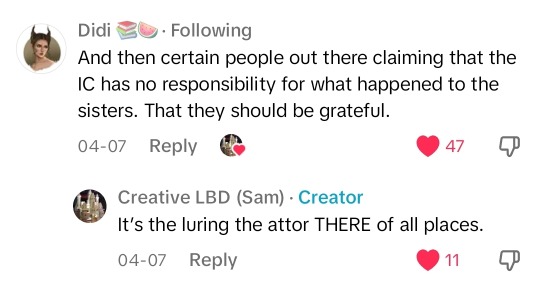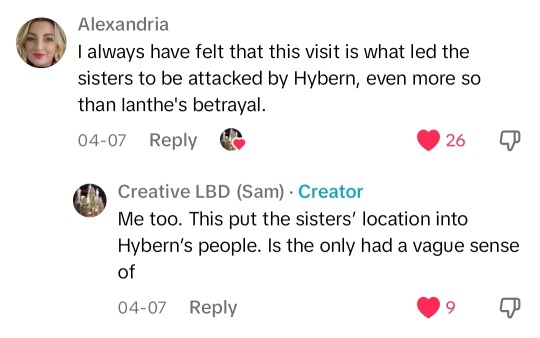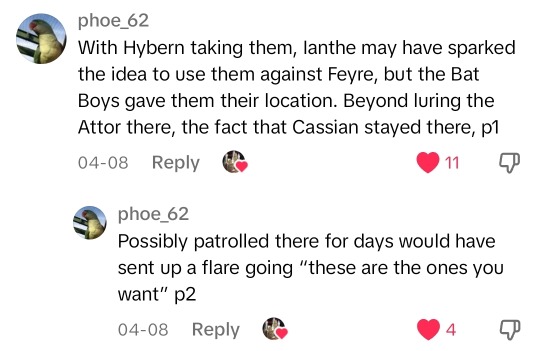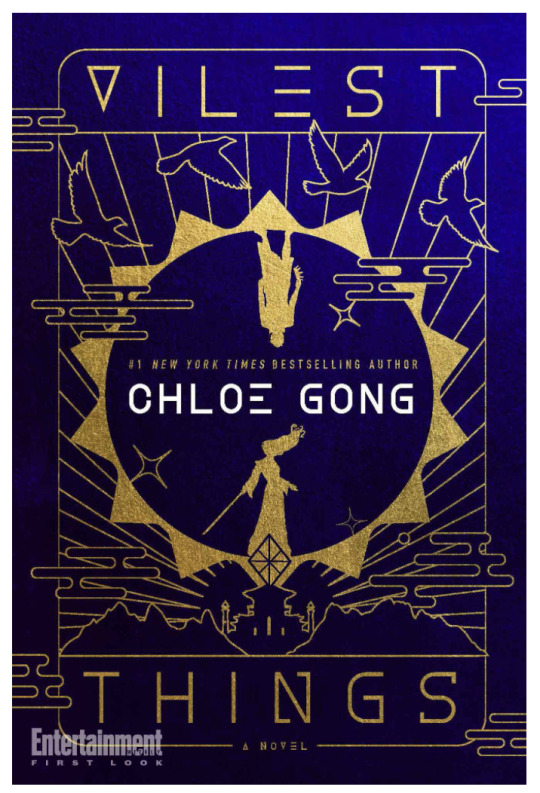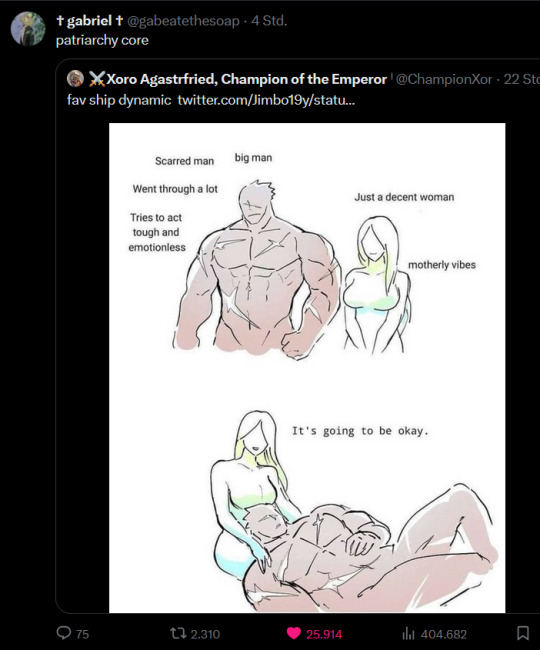Text
you would never catch me beefing with a man who can be called a pulitzer winning RAPPER
2K notes
·
View notes
Note
Not to come off as nitpicking but why can’t Feyre be a high lady? It’s not as if tamlim or Beron are any better and theyre centuries older than feyre. I get everything but I love feyre
Hi anon!!
You don’t come off nitpicky at all! Thanks for the comment!****
[long post - more under the cut - disclaimer at the bottom]
First — I agree with you. There’s no moral reason I can think of that rules out why Feyre can’t be High Lady; so, I agree with it. I’m going to go a step further and say it’s fine that Rhysand makes Feyre High Lady of the Night Court. Obviously, Feyre will learn and ease herself into the role.
Do I think Feyre should be a High Lady? No — but I think that’s because, as I mentioned in a previous post, I’ve always felt that Feyre chafes in structured, heavily-ruled settings and has been characterized heavily as a character whose strength comes from an admonishment of rules and expectations (In my opinion, based in the text ofc).
I also think that the story doesn’t lead with reasons why Feyre specifically should be High Lady. If we go with the logic that Feyre is an inexperienced young-girl who needs to learn how to lead then we acknowledge two things: (1) that Feyre has to learn and (2) Rhysand made Feyre High Lady. That way, the expectation is that Feyre does not know anything but will learn. Traditionally, women have consolidated power by marrying into it; its quite normal for women to be “the queen” because they married into power. If anything – I think it simply makes no sense that there hasn’t been a High Lady in almost 15,000 years; it seems like an obvious choice. There’s also genuinely no difference between Lady of the Court and being High Lady.
The problem with the story is that it does not want to acknowledge -- or at least fully acknowledge many things. The first is that Feyre wants to be made High Lady (or - to push back against that - the story wants her to be High Lady). If Feyre wants power, she's acknowledging she has some skills to be president. But like...she simply doesn't. She has many skills - none that really align, though. I also feel comfortable saying that Feyre doesn’t even really want to be a leader, and her narration often opposes the idea that she wants to be in positions of power; I think we can argue that Feyre wants power over her own life – but that is not the same as wanting power over an entire group of people. I often feel insane because I think its actually kind of weird that the story never spends time developing Feyre as a person with skills that translate to leadership – or even ambition. Let’s think about similar characters like Jude or Dany, the story goes out of its way to establish why they want power, and the skills they have.
Dany is a strategic genius at literally fourteen years; she has to grapple with her kindness and how it can be to her detriment. She has to establish boundaries between the members of her Queensguard. She uses her wits, sensuality (though – I have words for Grrm), strategy to cement her claim to the throne; she is advised to practice her rule in Essos. It’s not just the fact that Dany has a claim to the Iron Throne – she’s proven she’s got the skills to be both kind and harsh; political and strategic, wrathful and powerful. Dany is not a fighter – she is a queen. She’s calling the shots and she’s still kind. Jude is shown the horrors of Faerie very early on in the story – and that anecdote at the beginning of the story essentially informs the story.
And like Dany, Jude has to learn to balance kindness with politics; she learns early on that her kindness, while altruistic, can operate as (1) selfishness and (2) can ultimately amount to nothing. It’s not saying that these characters aren’t kind, or evil, but that they learn, to some extent, how to navigate these worlds by themselves. The story is not arguing that these girls are good and kind and therefore “worthy” to be made the leader; these stories are also not concerned with needing to moralize why the female leads are more deserving – we can just see that they have qualities that will translate well into leadership. So (at least in Dany’s case), when they make a mistake, we can actually think and discuss the validity of what makes it a good / bad action. We’re not just running with the fact that “well Dany is a girl and abused!” but rather “what can Dany do to improve and not make these mistakes again” – Dany herself literally always weighs her past experiences with new ones to avoid mistakes that can detrimental to her campaign. We know Dany has the skills.
Every time we question the validity of Feyre’s actions were often met with that initial argument, which is, that Feyre is essentially “just a girl” and “under duress” and “traumatized.” But they also don’t want to admit that Feyre doesn’t have a lot of the skills necessary to be leading the court, which is true (and not even a criticism, but literally a fact). It’s a fact that Rhysand made Feyre High Lady because she was his mate – which isn’t a negative and literally how nobility has kind of traditionally operated under in the past. Even Feyre going UTM says nothing about her skills as a leader. It's always bothered me that people use the fact that Feyre goes UTM to prove that she deserves be High Lady. It's just...she didn't go down there to save Prythian; as a matter a fact, Feyre only goes UTM because she realizes she royally fucked Clare Beddor - she goes there out of guilt. Once she gets down there, she has no choice but to complete those tasks because of the bargain. That matters. It really does. I also think this logic – someone like Nesta would also be qualified to lead the NC. It's why I think people get testy with the whole 'who would be a better high lady' or whatever. Because the way the book sets it up, everyone, including Feyre sisters are all equally if not more qualified for the role. I'd argue, Nesta has even stronger claim to a leadership. To be clear I am not arguing that Nesta should be HL or would make a good; only that the story provides more concrete examples of why she could be HL than it does its own main character, and by the end of Nesta's book she's clearly the stronger character (*cough* which is why I argue SJM obsession with Rhys comes at the detriment of feyre's character!) - and there are more concrete, intentional moments where Nesta shows skills that are actually relevant.
Again it proves that Feyre can be brave, but naught else. I really thought MAF was going to actually delve into the idea that Feyre feels like a fraud because of she really only went down there for Tamlin and to try to rectify her mistakes – and she ends up in this position of power that she seems super uncomfortable with. Similar to Katniss’s ordeal in The Hunger Games. Like – we don’t even kno the names of the two Fae she killed. The story decides that not deal with it. Feyre literally says something along the lines of “its not so bad I killed those not bad because at least everyone else was freed” – but the whole point should have been that she realizes that she’s not just sacrificing her own body for Tamlin, she’s taking someone’s life for the chance to be with Tamlin. Because she loves him. That should have challenged Feyre’s morals, earnestly. There should be a deep dive to what that means. We know that Prythian becomes free – but y’all that was the afterthought. Feyre deadass only asked for Tamlin’s curse to be lifted. She didn’t even consider the people when she made the bargain and if SJM (or Amarantha) were smart enough she would’ve picked up on it all.
The story essentially bastardizes why Feyre decides to go UTM. Feyre doesn’t learn anything; she doesn’t learn how to read because she realizes It almost kills her, she doesn’t stop making weird, impulsive bargains, she doesn’t learn how to navigate politics, or listen for hints of information when Tamlin says no to her – nothing informs her actions, she doesn’t learn new skills in her arsenal – things just always go well for her. Feyre isn’t diplomatic – at the High Lord meeting she literally attacks another High Lord, she doesn’t show any prowess with Keir, doesn’t do things her own way and decides to defer to “the way its always been”
I’m not talking about how moral it is for Feyre to be able to do something. I’m saying that Feyre never has to learn skills to handle adversity; when she doesn’t get her way the story throws temper tantrum for her. Beron said something mean so Feyre had to attack him – what does that prove? She essentially insults all of the High Lords, doesn’t make amends with Summer or Spring – and the story just expects them to follow her because….shes just a girl. And they do – for no other reason then the fact that Feyre is Feyre. And because there’s no emphasis on her actual skills, when we ask “what makes Feyre deserve to be High Lady’ – we get a frustrated response that says “well – she’s new at the job! She’ll learn!” but like…she never does. And again, what qualified her to be there in the first place If she supposedly still doesn’t have the skills. What moment informs this idea?
So, to stop my rambling, I agree that Feyre should be HL, but I also believe the story should develop her character's actual skillset instead always relying on bastardized generalizations of plot points that the story uses to basically argue that Feyre "deserves" the title without ever giving any skills to actually fall back on. the difference between , then Tamlin and Beron (maybe - we don't know) is that they inherited power, Feyre wants to lead. She wants to be High Lady. She isn't burdened with the responsibility she wants in (or story wants in). That means she should have skills to reflect that want.
***[two things I should note: (1) I was already writing a post that touches on some of the things I've discussed - so there's a lot of universal 'y'all/they/them thrown around - but I am not talking about you nonny; its toward the middle and end (2) this is a longer post bc I combined some of things I already wrote a couple months back! I really appreciate your comment and kindness]
109 notes
·
View notes
Text
Well, again, the issue is not that Rhys has done bad things, it’s how those actions are framed in the story. Let’s think about this – if Rhysand’s actions UTM were framed as negative then perhaps we would not be having this conversation.
Of course, we can argue that Rhysand (1) has developed negative coping mechanisms / perspective (2) Rhysand’s trauma informs the things that he does (both pre, during, and after UTM), and (3) Rhysand’s position was uniquely isolating because of the nature of the role he was forced to play. These are points that I believe can be argued and offer an interesting view; but for any of that to happen, we have to acknowledge that the behaviors are negative. That’s often the problem with the arguments that begin to arise – no one wants to admit that Rhysand has developed (or just has) negative qualities and behaviors. No one wants to contend with the reality of consequences. “Rhysand has always admitted that he would be willing to do terrible things for his family” – and yet there’s no elaboration on those “terrible things.” No one wants to talk about those proposed negative qualities. The story (and the audience) don’t want to admit that Rhys doesn’t really have a solid moral high ground over Tamlin, or admittedly other villains. Just because Rhysand “admits” he’s prone to basically being abusive doesn’t…make it any less abusive.
My proposed argument about Rhysand’s actions UTM are this: he chose to sexually assault Feyre, he chose to “protect” Feyre in ways that were extremely sexually explicit. I believe these are choices that Rhys chooses to make – and I believe they say something about him. It’s noted, to me, that Amarantha scarcely makes Rhys do anything that he does to Feyre. I also believe that his actions regarding Feyre were done with an air of autonomy; as in, I believe Rhysand takes these measures into his own hands. Ultimately, I believe that while Rhysand has to contend with the horrors, he himself becomes beholden to them at some point and ends up perpetrating the same behaviors.
We cannot argue that Rhysand sexually assaulted Feyre, and then argue that it doesn’t say something about him. It does. In the realm of the story – from a writing standpoint – I think a good author can still make a character like that sympathetic and understandable (see: Nahadoth and Itempas from N.K. Jemisin’s Hundred Thousand Kingdom). If I were analyzing Rhysand’s actions, I would simply make the argument that perhaps Rhysand’s abuse of Feyre mirror’s his own abuse by Amarantha hands, and he potentially sees Feyre (and her hope) as something to be threatened – or even shamed by. If Rhysand’s actions were written in a way that clearly exemplified that his actions are not meant to be praised (and are NOT are reflection of love) then he could be salvaged. I actually believe a lot of the abusive things Rhysand does makes sense given the environment and if the story leaned into this from a storytelling perspective and did away with needing to moralize, then this would all be fine. Framing Rhysand’s abuse of Feyre as something to be praised, admired, and loved for is actually quite insane. If we frame his actions as purely preservational and self-serving, that would make so much sense. Imagine being in Rhysand’s position; I guarantee everyone would do whatever they could to stop such extreme amounts of abuse and sexual violence. And even then, the story could still create a narrative that warns of the danger of sexual violence and consent, it would just be subtextual and more allegorical than concretely written in the text. Starting Feyre and Rhysand off in such a tragic place, having Feyre and Rhysand acknowledged truly what happened, having them discuss ways for both of them to move forward while building up the mating bond in the background. Have Feyre acknowledge this untrusting, sly, slick part of Rhysand and have her not assume her mate does everything out of the kindness of his heart. Build their romance out of a place of mutual atonement – play on the theme of guilt Feyre feels and the whole premise of the court. Let the connection between Feyre and Rhys be that they truly acknowledge each others darkness (and also let Feyre do selfish things – maybe she knew damn well Clare Beddor’s family might suffer a bad fate but its not her family and Feyre would do anything for them; Let Feyre kill those fairies with ease because she cares about her life. Let her contend with reality that she would actually do anything for her family and then have that be a connection between Rhys and Feyre.
Something that has always bothered me about the “we don’t talk enough about Rhysand’s trauma” argument that gets thrown around when we earnestly discuss the validity of his actions is the presumption of innocence in that statement. The unwritten statement is that the trauma somehow explains and simultaneously absolves him of the implications of his actions. I objectively agree with the sentiment – Rhysand’s trauma is not talked about enough and it should be. The argument dancing in the corner is the fact that people believe that Rhysand’s extreme amount of trauma absolves him – even going as far as essentially say that Rhysand’s abuse operates out of fear (or because of fear) which is essentially the exact same ideology the book bashed Tamlin for. In the end, the cycle just comes back around and the abuse gets pushed into the backdrop.
107 notes
·
View notes
Text
The Paradoxical Nature of Feyre
It’s interesting to consider just how much of Feyre’s character must overcompensate for Rhysand’s shortcomings as a character. I’ve always wondered at the impossibility of the morality involved in the characterization of feyre; in which, Feyre exists – as @feyres-divorce-lawyer has already elaborated on this this post – in this violent conundrum in which is operates as both the most qualified, but is oftentimes then characterized as the most inept to help.
To elaborate – Feyre’s character has to subsume an almost reverential when she is discussed in thorough conversations that question to her motivations, tactility, and efficiency. And because Feyre is never actually given qualities (or I should say – those qualities are never at the forefront when discussing why she is placed in these hierarchal / leadership positions) that prove she deserves to be a leader there’s no actual, tangible evidence to prove that Feyre is inherently qualified for any of these roles. When Helion asks Rhysand – “why did you make her High Lady” the story does not lean onto to any tangible reasons as to why we the reader should believe this other than ‘Rhys loved Feyre’
Here enters the actual problem with Feyre’s character: her being High Lady is a statement of Rhys goodness, not a statement on Feyre’s prowess. Because the story leans on such individualistic, arbitrary ideals, there’s nothing being said about Feyre as a character. So much of these conversations centers around Feyre being qualified but there’s nothing in the story that suggests otherwise. Feyre being reckless and brave prove that she is….reckless and brave – both those qualities don’t really make a good leader and they prove…nothing about Feyre’s skills. Realistically, of course Feyre knows close to nothing – of course she’s going to make very bad decisions and mistakes, of course her per view is limited. So much is put into proving that Feyre is the best that there’s often no conversation about how rigid that makes Feyre as a character.
Those are flaws that make Feyre a better character. One of my favorite moments when reading A Storm of Swords was the moment Davos realizes he needs to be able to read because ‘he’s a lord now.’ I love how he reflects on how hard the process is and how the children seem to read so easily and he has to sit down and sound out the words. Davos is such a good character because he represents the kind of struggles someone – lowborn, smuggler, illiterate, might have when integrating themselves into a new hierarchal world. But this also says something about him as a character – he chooses to begin the journey to learn how to read because he’s realized he needs tools in order to combat is inexperience. Even the fact that it’s not Feyre who realizes she needs to learn how to read but Rhys who forces her says so much about her character, negatively.
So when we have these conversations about Feyre, no one ever actually proves what makes Feyre qualified to lead. Begrudgingly feeding your family because you feel obligated doesn’t prove that you can lead an entire town; it proves perhaps resilience, perhaps resourcefulness but even then id argue Feyre isn’t even that (see: she seems to not learned any other skills other than hunting, complains about her shoes instead of just mending her own or switching with Nesta or Elain; she can’t cook, etcs). Rhysand making Feyre High Lady because he loves her says nothing about her as a character. It doesn’t expound her talents and skills – and ultimately doesn’t make anyone believe the title is tangible. Even the story doesn’t believe that to be true. Nothing about Feyre’s trials UTM prove that she is capable leader – if anything they prove the opposite (I do not mean this negatively – if anything, I’ve always felt that Nesta’s arc with the Valkyries fit Feyre much more than her own arc did. I could see Feyre being someone who operates under her own set of rules. I’ve always felt that Feyre seems to chafe under rules , so it doesn’t make sense that she would bound herself to such a leadership role as High Lady).
Back to the main point – the whole I’m making is that I believe that Feyre is talked about this way because so much of her character has to be muted to connect with Rhys. I think this conversation is always a consequence of Rhyland’s characterization and the novel's (and stans) rush to defend him. So many things have to be true about Feyre in order for her romance to Rhysand to be believable - and I argue that those changes are to the detriment of the traits Feyre's is initially characterized as having. And because Rhysand never has to undergo an actual character arc the pressure is placed on Feyre's character to align with the more negative traits Rhys possesses. Realistically, given how Feyre is characterized and given the whole “I hate the preening, gawking Spring Court” – I think its weird that she would immediately (1) do the exact thing in basically nothing with Rhys (2) allow herself to be turned into the most traumatic version of herself and (3) delight in random people’s pain. But because the story never asks Feyre to introspect she simply doesn’t talk about it. And even if the story wants to go there – so much of Feyre’s healing hinges on affirming that she is good and so introducing these bad, carnal, selfish thoughts into the mix seem to undermine that.
136 notes
·
View notes
Text
anyways i hope y’all know fmc’s should still be fmc’s even after they become mothers…. like tell me you know that pls
105 notes
·
View notes
Text
Juliette, the Girlboss Trope, and Structural Change
From what I’ve observed, stories with “girlboss” protagonists tend to be less likely to critique existing power structures and end up focusing more on slightly tweaking surface level aspects of them to allow the protagonist to prove themselves within the context of the existing system. To me, this is extremely interesting within the context of These Violent Delights because Juliette is arguably initially set up to fulfill this archetype. Because she is a girl, her claim to the status of heir is questioned by those around her more than it would be otherwise. She feels more pressure to be ruthless and to do whatever she can to earn the respect of those around her. Toward the very beginning of These Violent Delights, she threatens to kill Tyler when he attempts to upstage her, saying that she will kill him before she lets him take her heirdom away from her. Without knowing that These Violent Delights is a Romeo and Juliet retelling, it wouldn’t be unreasonable to expect Juliette to become the leader of the Scarlet Gang and somehow fix things from the inside at the end. She is well set up to be the Strong Female Protagonist ™ who takes what is owed to her and is hardened and kickass and ruthless and doesn’t let interfering men get in her way.
But importantly, regardless of how much Juliette initially knows it, this is a facade. The image of the hardened ruthless heir may be one that Juliette encourages, but it is a heavily distorted reflection of who she truly is. Because at her very core, though she was raised to be the heir of the Scarlet Gang and therefore should be the literal personification of the continuation of the blood feud, that is not who Juliette is. Throughout the duology, her main motivation is protecting those she loves. At first, she believes that she can do this by working within the existing system. She tries to legitimize herself as heir within the existing power structure of the Scarlet Gang. However, the Scarlet Gang Juliette is set to inherit is one built upon a foundation of fractures that legitimizes its existence through the perpetuation of the blood feud to the extent that to solve the blood feud, or even seek to calm it, would be a violation of its very nature. The Scarlet Gang could never accept a leader that sought to do this, nor could the White Flowers, who equally rely on the blood feud as a source of power, accept the figurehead of their rival gang as an ally. To do so would be a fundamental betrayal of the nature of these two groups. Thus, Juliette must choose between legitimizing her position as heir, bringing more suffering upon the people and city she loves in the process, and giving up her position as heir and forfeiting her power.
But if Juliette forfeits her power, who does she forfeit her power to? After all, if she merely walks away, the blood feud will still exist. The refusal of one person to fall in line cannot topple an entire system. The answer comes back to Tyler who, unlike Juliette, truly is meant to represent the continuation of the blood feud. He feels the need for vengeance and hatred at his core, and is constantly suspicious of Juliette, recognizing her lack of loyalty though it is incomprehensible to him. Ultimately, there was never room enough for both of them. When Juliette threatened his life in These Violent Delights, she did so out of fear of him usurping her place. Little did she know, he already had. In representing the longevity of the blood feud, Tyler, not Juliette represents the longevity of the Scarlet Gang. While she was the heir in name, he embodied the very lifeforce of the gang. In a way, he almost represents the Juliette that could have been. And that is precisely why Juliette had to kill him.
Though Tyler’s death is foreshadowed by Juliette’s initial threat in the first book, when she shoots him in Our Violent Ends, it is not the callous, unfeeling kill of an heir pushing aside the final obstacle before claiming their rightful place at the top. Instead, it is Juliette’s final severance from the vicious cycle of the blood feud and the illusion of her status as heir. She recognizes that the power she would wield as the future leader, or even the true heir, of the Scarlet Gang stakes its legitimacy in the continuation of the blood feud, and therefore, she would lose legitimacy as a leader if she were to act against the blood feud. This is further demonstrated when Lord Cai tells her that she can choose between dying a White Flower and being heir following his discovery of her relationship with Roma, representing her direct defiance of the blood feud, and her murder of Tyler, representing her sabotage of the longevity of the blood feud and her rejection of her status as heir.
By this point, Juliette has established that she cannot live as a part of the blood feud. She put a bullet through its heart, firing on her own kin to do so. Because the blood feud has no future, she can no longer pretend to occupy the role of heir. But at the same time, in killing Tyler, she has rejected her place within the blood feud. She cannot die a Scarlet, and she cannot die a White Flower because she refuses to be either. In the end, it is not her and Roma’s apparent deaths that aid the end of the blood feud. Instead, it is their rejection of its perpetuation through their rejection of their statuses as heirs. Their continued survival after their apparent death and the birth of their daughter stands in direct defiance to the division brought on by the blood feud. Though, as is further explored in Foul Lady Fortune, this division is still very present, Roma and Juliette’s continued survival both acknowledges that the kind of change required cannot be brought about by the efforts of one titular protagonist, no matter how world ending their sacrifice, and gives hope for a better future. Unlike the girlboss protagonist, Juliette rejects the status quo and achieves her goals by rejecting power. Instead of seeking to be the figurehead of change, which would also be extremely ahistorical, she does her part and steps back, acknowledging that as a singular person, she does not and should not have the power to fix everything. In the end, she watches from the outskirts of Shanghai, and though she is doomed to forfeit her place within her home to protect the people she loves, she is safe enough to live with her husband and raise her daughter and use her remaining connections to do what she can. Because in the end, one person cannot fix everything, no matter how powerful they are. And the spark of hope represented by Juliette and Roma’s continued survival and the birth of their daughter as well as the protection offered by their weapons ring is enough.
47 notes
·
View notes
Text
I feel like this is a good time to remind everyone that Immortal Longings and Vilest Things are ADULT Fantasy, and Chloe has made it very clear that there is some content not appropriate in there for some of her younger audiences. It also portrays an intentionally toxic relationship that is often mischaracterized as romantic.
Here are the trigger warnings for Immortal Longings (The ones for Vilest Thjngs are not out yet):
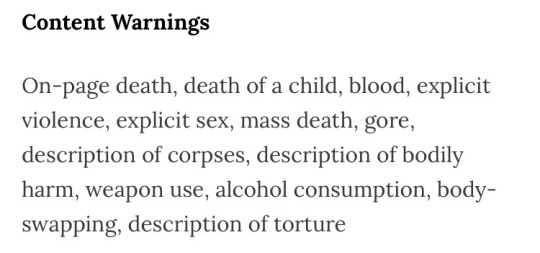
16 notes
·
View notes
Text
A nonbinary child was murdered recently and I’ve been reporting multiple transphobic comments misgendering them, mocking their death, and deadnaming them. But they stay up. Tumblr won’t do anything about it. But they drop everything to permanently ban a trans women.
Really shows their priorities.
22K notes
·
View notes
Text
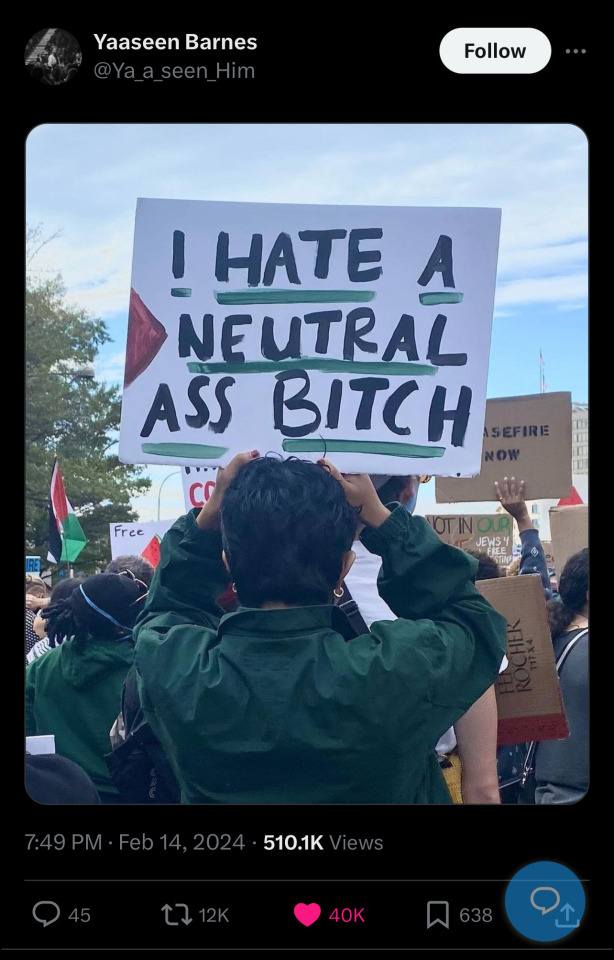
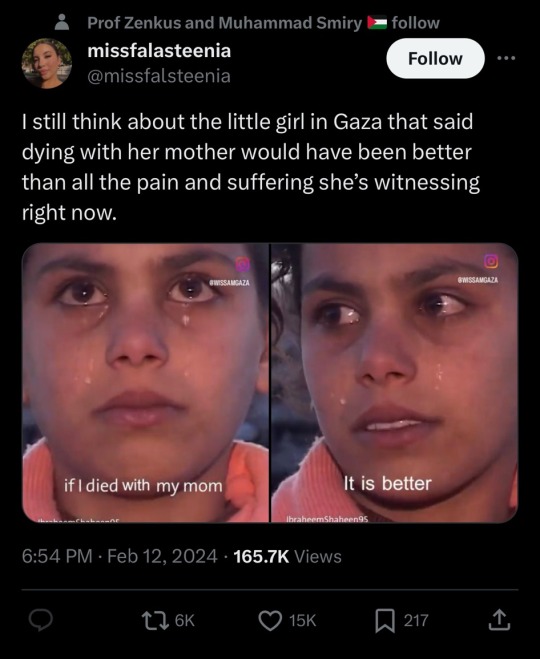
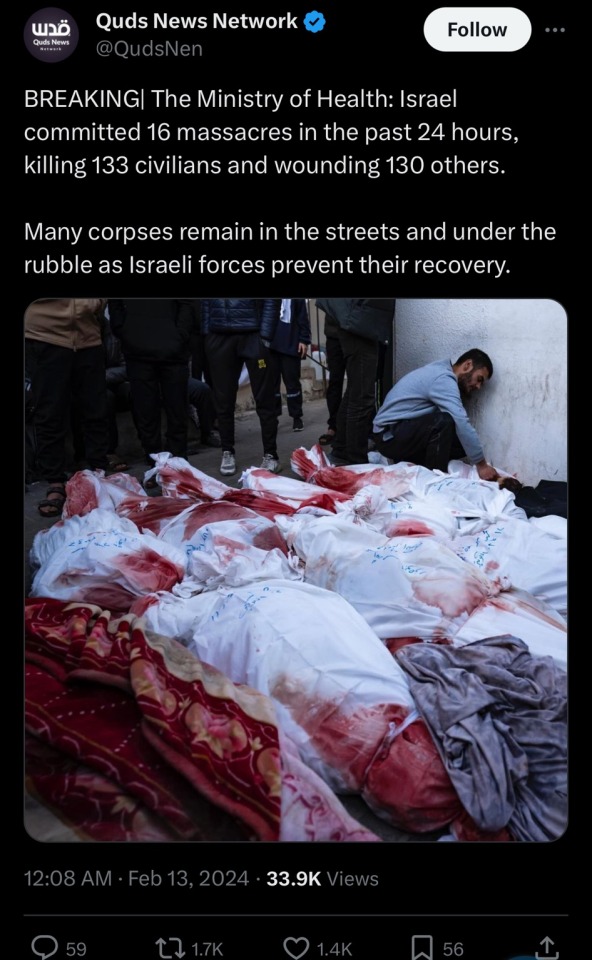

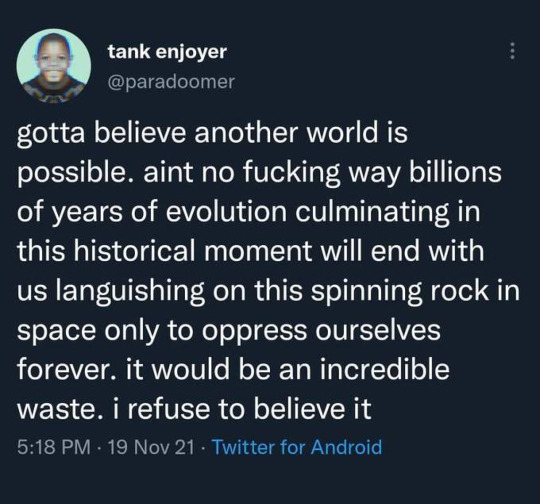
A new world is possible, my friends. Le Guin famously said: “The profit motive is often in conflict with the aims of art. We live in capitalism. Its power seems inescapable; so did the divine right of kings. Any human power can be resisted and changed by human beings.”
We WILL free Palestine
13K notes
·
View notes
Text
looking at (vetted) gofundmes for people trying to escape palestine and i don't know how many of you actually click on the gofundme links you reblog but i would like to point out, for what it's worth, just how amazing it is that so many have raised so much money. it may overall feel like a drop in the ocean but the fact that several gofundmes have raised tens of thousands of dollars is amazing. it is so expensive to leave gaza right now, and people still need money after they escape. but regardless of what propaganda the US, UK, canada, and other western nations are trying to pump out, people across the world are doing what they can to help these people survive. many of them are still very far from their goals (like this one and this one and this one) and some of them are very close to high goals (like this one), and some of them have reached almost double their original goal.
and that's not even addressing direct aid or organizations that take continuous donations for distribution of food, menstrual products, etc. the PCRF has raised $16,000,000 of their target goal of $20,000,000 to fund current aid and long-term relief efforts in gaza. ANERA's febuary 13th update discusses the material ways they helped palestinians today:

(ANERA donate link)
my point is, it often feels like the world is turning a blind eye to palestine. but i would like to point out that there is an important difference between "the world" and "western political leaders and media narratives". a breathtaking amount of real people, the people who make up the world, are trying to help. in the face of israel attempting to commit genocide, the world is saying No. These people deserve to live. and literally sending millions of dollars internationally, through the internet connection that israel has desperately been trying to destroy.
it may not feel like it matters in the grand scheme of things. but to the people who get fresh clothes, or a hot meal, or blankets, or the kids who get new toys, or to the people who are able to bring their families to safety, it matters to them. go make someone's day better. i've linked so many options with ways to do that.
27K notes
·
View notes
Photo

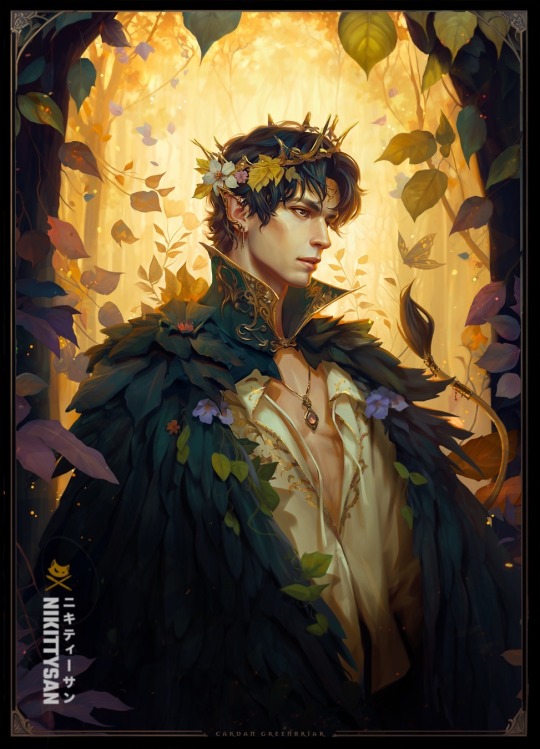
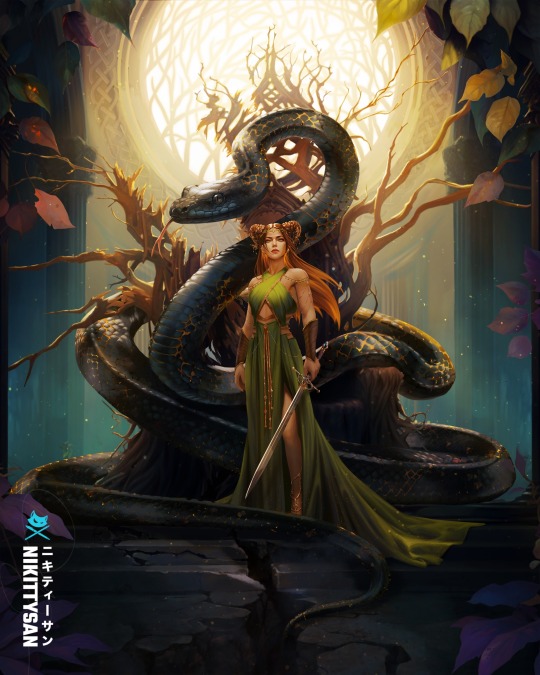
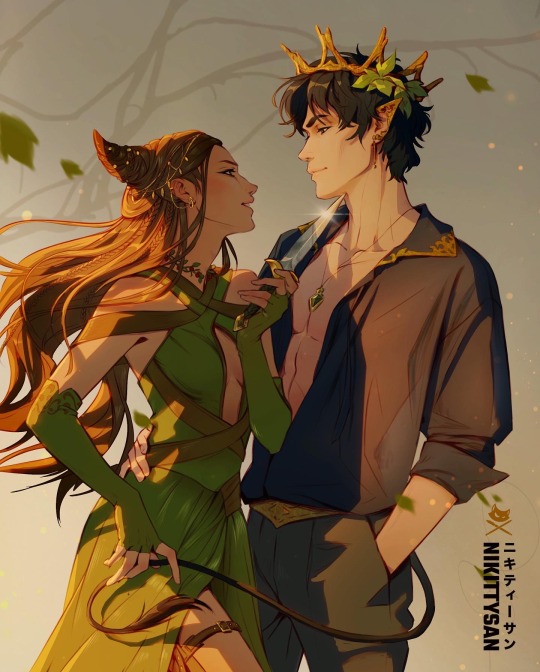
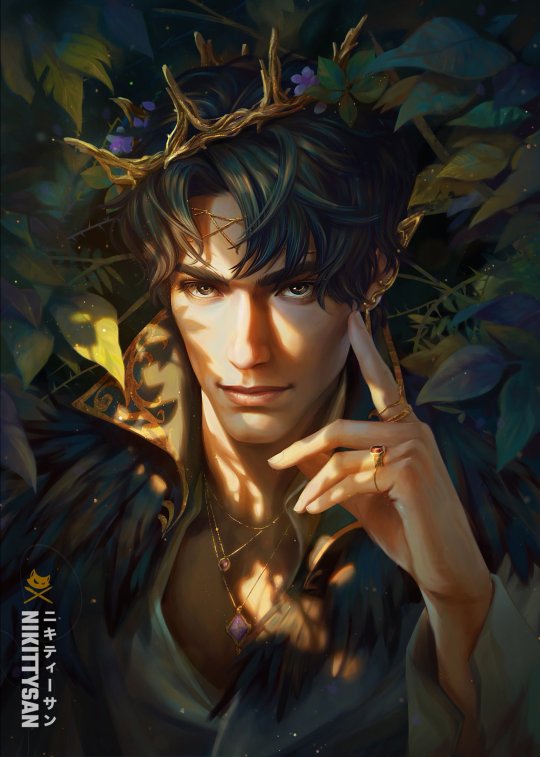
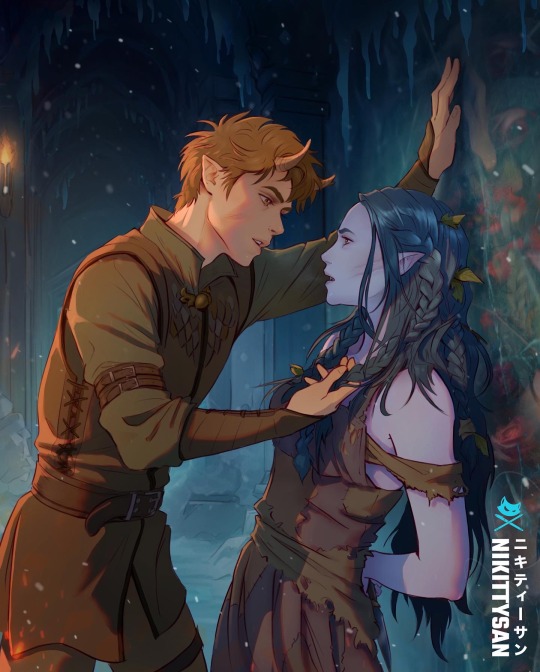
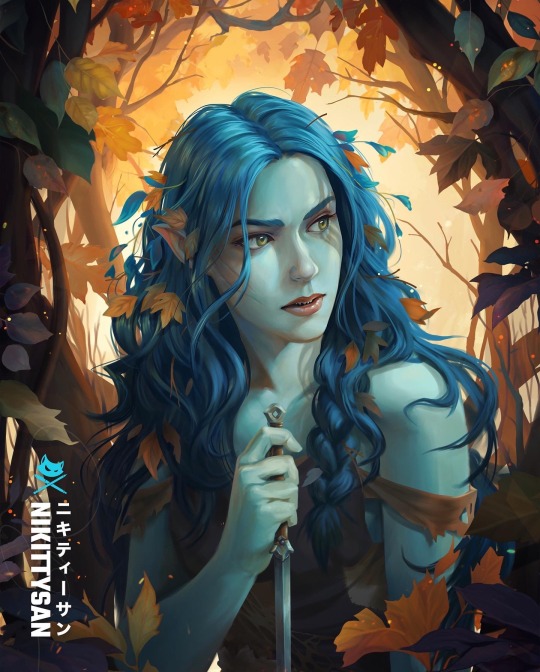
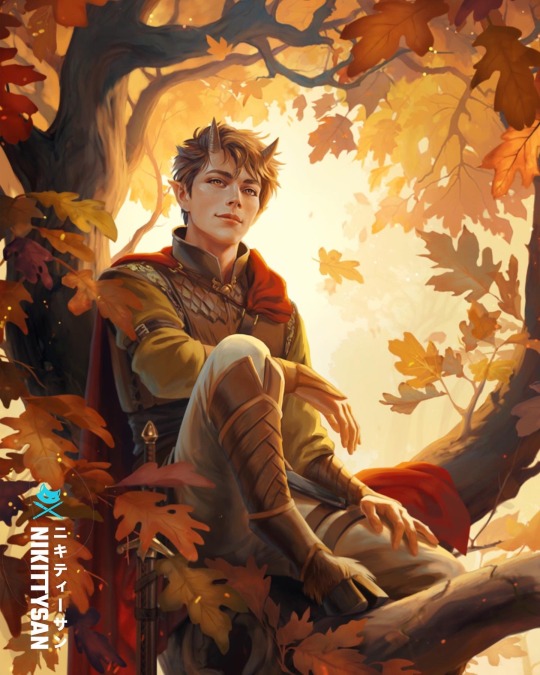
The entire set of Folk of the Air/Stolen Heir fanart I did!
5K notes
·
View notes
Text
Jurdan gets funnier and funnier the more you think about them and realize how much of a big loser both of them are when it comes to love.
Mfs get married to supposedly "form a trustworthy alliance" -> Cardan exiles Jude the next day to impress her, because apparently his rizz disappears when it truly matters 💀 -> Jude takes it seriously, stays in the human world for months and is salty af -> Cardan cries himself to sleep and writes pathetic little letters to her. Like wow you did that to yourself you dumb bitch 😭
And don't get me STARTED on their dumbass confessions. Cardan's was, I'm pretty sure, 80% on a whim. Like, maybe he had prepared the words in his mind but he didn't plan to confess to her right then and there at such a bad time. Says "well you probably already guessed as much" at the end then RUNS AWAY probably because he's overwhelmed and Jude is left standing there like???? No I fucking didn't guess you liked me lmao??? I'm dumb af bro, should've been this direct from the start :')
And Jude's is also hilarious because she says it kind of hurriedly as soon as they're alone, since she had promised herself to tell him the first moment they get together. Girlie confesses and CARDAN DOESN'T BELIEVE HER 😭 so homegirl has to EXPLAIN in DETAILS when she thinks she started to fall for him, why she started to like him, why she believed he didn't like her and why she felt the need to hide it. And ONLY after that whole ass explanation Cardan's finally like "omg!!! You liked me because I'm clever and funny?!?? Omgggg..."
Those fuckers were really married for months before fumbling their way through awkward confessions because they can't indulge in the thought that the other likes them. Like they were legit EMBARRASSED to admit that they like eachother while being MARRIED. Please this is so unserious, get real.
3K notes
·
View notes
Text
"Cassian is Nesta's mate. If he dies, it will hurt her for the rest of her life"
yeah and he will hurt her for the rest of her life
167 notes
·
View notes
